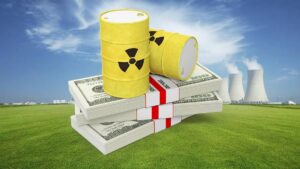Argonaut’s fund manager extraordinaire David Franklyn has five key companies to play the big themes in mining

Pic: RichVintage/E+ via Getty Images
- Argonaut’s David Franklyn says he looks for quality and value when it comes to picking miners who will succeed long term
- He says Pilbara Minerals’ market cap is a hint investors are punting on higher lithium prices, with uranium, copper and gold all looking like strong sectors
- These are five of his key mining picks in the future facing metals and gold space
In a market travelling sideways it can be hard to pick the winners that are going to standout.
And in resources stocks, where the boom time euphoria that saw all boats float in 2021 has subsided, experts think the key is latching onto companies that have quality and value no matter the fundamentals.
That was the message David Franklyn, portfolio manager for Argonaut Funds Management, shared as he delivered his five key resources stock picks at the Future Facing Commodities Conference hosted by Resource Connect Asia, Vertical Events and Tribeca in Singapore on Thursday.
Argonaut’s natural resources fund is up a tidy 188% since its inception in January 2020, and has largely held its value this financial year after 44% and 27% gains in 2022 and 2023.
Its gold fund is up 9% since opening in November 2022, a nod to the dullness of gold equities in spite of record prices and a fertile macro environment for the precious metal.
The gains in natural resources fund have closely tracked the rise of battery metals, which boomed from 2021 to 2023 before a pullback in the back end of last year.
Franklyn said the key themes for commodities remained their role in the energy transition and the increasing geopolitical risk being seen across a fragmenting global diplomatic landscape.
“It’s been a difficult 6-12 months for energy transition and all those future facing metals. What that has meant for lithium ion battery prices though is they’ve fallen, and China being a real driver of that industry has been able to produce cheaper vehicles and continue to grow their EV market,” he said.
“The second thematic is geopolitical risk and that ties into the future facing metals as well because a lot of locations where those future facing metals are in locations where there is some some risk.
“A good example of that is copper where roughly 40% or more of global copper supply comes from South America and South America has typically had supply disruptions over over time. There was a major disruption this year in Panama, where a major copper mine was put on care and maintenance. So I think that’s an ongoing thematic.”
Will value re-emerge?
For a number of commodities, Franklyn says China’s dominance in the supply chain either as a source of supply, demand or both has led to big price drops.
That is notable in rare earths and graphite, which have both halved or more in the past couple of years as China has ramped up its supply quotas or, in the case of graphite, increased synthetic production.
But there are plenty placing market bets that the sell off in battery metals has overshot.
Franklyn said the valuation of Pilbara Minerals (ASX:PLS), for instance, suggested insiders expect lithium prices to rise further.
“In the last half yearly result the EBITDA margins were about 55% based on an average price of US$1,645 per tonne, but that’s for a 5.3% concentrate, the standard is 6%. So the equivalent of that is US$1800/t,” he noted.
“To me, the group’s got a market capitalisation of about $12 billion on those kinds of half year numbers if you annualise them (at spot prices), it’s difficult to come up with a value that justifies that market cap.
“So I think the market’s saying we think that the prices are near the bottom, we think there’s some upside, maybe a long term medium prices around US$1,500 to US$2,000 per tonne. So I think that gives you gives you some optimism.”
Franklyn also says there are gains to be made in uranium and copper based on supply-demand expectations.
“The price of uranium has doubled in the last 12 months. And if you look at supply and demand going forward, you’d suggest that there’s further upside,” he said.
“Copper’s a consensus buy if you’re in future facing metals. Most of them have fallen over the last year as we’ve talked about but copper has been very resilient. Demand is still very strong. The outlook is very positive.”
FRANKLYN’S FAB FIVE
PATRIOT BATTERY METALS (ASX:PMT)
Argonaut’s best bet in the lithium space is developer Patriot Battery Metals, which recently promoted Australian mining legend Ken Brinsden to lead its exploration efforts in Quebec’s James Bay Province in Canada.
“We’re looking for the more advanced tier-1 scale development assets and the one we really like is Patriot Battery Metals,” Franklyn said.
“Its market cap is about $1.2 billion and (it has) a high grade deposit — 110 million tonnes or about 1.4%. But that’s likely to grow to 150Mt or more.
“I think in all these companies and in investing you’re always looking for high quality management and Ken Brinsden, who was the managing director of Pilbara, he’s come on board at Patriot moving to Canada to run this business.
“We think that’s pretty exciting, it’s our favourite on the lithium side.”
NEXGEN ENERGY (ASX:NXG)
Franklyn said uranium is the ‘next big thing’, with nuclear utilities having until now been able to rely on inventory drawdowns to keep that going.
Now they need to lift prices to induce uranium miners who have been gestating their assets for eons into production.
“There is really one company that I think is a standout in the sector. It’s an emerging developer pushing forward to production and that’s NexGen Energy operating in the Athabasca basin in Canada,” Franklyn said.
“It’s received its provincial approvals already — the approval process as you would imagine in uranium is difficult and time consuming — the federal approval should come through this year.
“They’ve got a big resource, very high grade, a multiple of what most companies in the sector have. Its market cap is already $6 billion Canadian so it’s recognised as a major player.
“It’s going to be producing more than 20 million — potentially 30 million pounds — of uranium per year. So that’s about 25% of the global market today and I think something like 50% of Western demand. So it’s going to have a major impact and its costs are going to be very low at about US$20 a pound.
“At US$100 a pound it would be making EBITDA of about US$3.4 billion, so that shows you there’s upside as they go through that process of building the facility and starting to produce.”
METALS ACQUISITION CORP (ASX:MAC)
In the copper space, Argonaut is looking no further than the newest mid-tier copper exposure on the ASX, the ~$1b capped Metals Acquisition Corp.
“(It) owns the CSA mine in Cobar. Very high grade, very good management team, we think it will emerge as one of the go-to copper stocks in the Australian market,” Franklyn mused.
Purchased for US$1.1b from Glencore last year, CSA contains a mineral reserve of 7.9Mt at 4% copper for around 314,000t of the red metal and produces around 40,000t of the commodity a year.
But, led by former Detour Gold boss, MAC has started drilling to reveal new high grade zones and digitise hard copy data from the orebody’s top 850m that could unlock new targets.
GENESIS MINERALS (ASX:GMD) and CAPRICORN METALS (ASX:CMM)
Last but not least Argonaut is still bullish on gold, a well-timed take given prices just hit all time highs of US$2193/oz on the London Bullion Market Association on Wednesday.
“I think it comes back to that geopolitical risk factor. What we’re looking for there is gold prices should continue to move higher as interest rates fall,” Franklyn said.
“There’s three key drivers of gold, you’ve got China-India demand, particularly jewellery and retail demand, which has been steady.
“Central bank buying, particularly Russia, China, Uzbekistan, Turkey, etc. have really driven the price over the last 12 months. What’s been lacking is the general investment market through exchange traded funds kicking in, we think that we’ll see improving demand from that area.”
Franklyn said long-life miners with demonstrated production growth opportunities were favoured by Argonaut, singling out Capricorn Metals and Genesis Minerals.
Capricorn owns the low cost Karlawinda gold mine in the Pilbara, where it will produce up to 125,000oz this financial year, but it plans to more than double that by developing the Mt Gibson gold mine in WA’s Mid West by the middle of the decade.
Genesis meanwhile bought the Gwalia gold mine last year from St Barbara (ASX:SBM) and will use that and the Laverton Mill acquired in a takeover of Dacian Gold to try to rebuild the historic Leonora goldfields into a major gold production hub.
The Raleigh Finlayson-led miner last week rolled out a long-awaited five-year strategy, projecting it can grow production from ~130,000ozpa to 325,000ozpa by 2029 and bring down costs from $2400/oz to $1600/oz by boosting its scale in a regional consolidation play.
David Franklyn’s Fab Five share prices today
Related Topics

UNLOCK INSIGHTS
Discover the untold stories of emerging ASX stocks.
Daily news and expert analysis, it's free to subscribe.
By proceeding, you confirm you understand that we handle personal information in accordance with our Privacy Policy.








